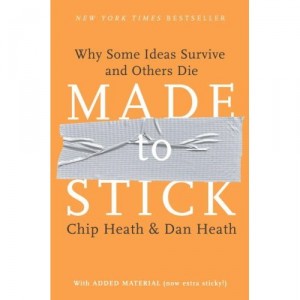 Messages come in many forms: corporate mission statements, taglines, campaign mantras, etc. And, all have the single goal to be memorable. Like we established in the last post, why bother creating messages that don’t stick in people’s minds and drive people to action?
Messages come in many forms: corporate mission statements, taglines, campaign mantras, etc. And, all have the single goal to be memorable. Like we established in the last post, why bother creating messages that don’t stick in people’s minds and drive people to action?
There are many great examples of sticky and not so sticky messages in July’s Book Club selection, Made to Stick by Chip and Dan Heath . Highlighted below are some comparisons of sticky and easily forgotten messages from the book. I have also highlighted a few sticky messages from my own experiences.
Book Example 1
Sticky message – John F. Kennedy once said, “Put a man on the moon and return him safely by the end of the decade.”
SUCCESs principles used: simple, unexpected, concrete, credible and emotional
Not so sticky message – If JFK was a CEO, he would have likely said: “Our mission is to become the international leader in the space industry through maximum team-centered innovation and strategically targeted aerospace initiatives.”
Book Example 2
Sticky Message – A pomelo is basically a supersized grapefruit with a very thick and soft rind
SUCCESs principles used: simple and concrete
Not so sticky message – A pomelo is the largest citrus fruit. The rind is very thick but soft and easy to peel away. The resulting fruit has a light yellow to coral pink flesh and can vary from juicy to slightly dry and from seductively spicy-sweet to tangy and tart.
Book Example 3
Sticky Message – Anti-littering campaign tagline in Texas: Don’t Mess with Texas
SUCCESs principles used: simple, concrete and emotional
Not so sticky message – Please don’t litter
Additional sticky messages you may remember…
Drug campaign slogan: “Just say no”
SUCCESs principles used: simple, unexpected and concrete
The Golden Rule: Treat others as you would like to be treated
SUCCESs principles used: simple, concrete and emotional
Drunk driving campaign slogan: “Friends don’t let friends drive drunk”
SUCCESs principles used: simple, concrete and emotional
Made to Stick will make you a better communicator. So remember, for sticky messages, follow the six SUCCESs principles (Simple, Unexpected, Concrete, Credible, Emotional and Stories) and watch people not only recall you message, but be moved to action as well.

